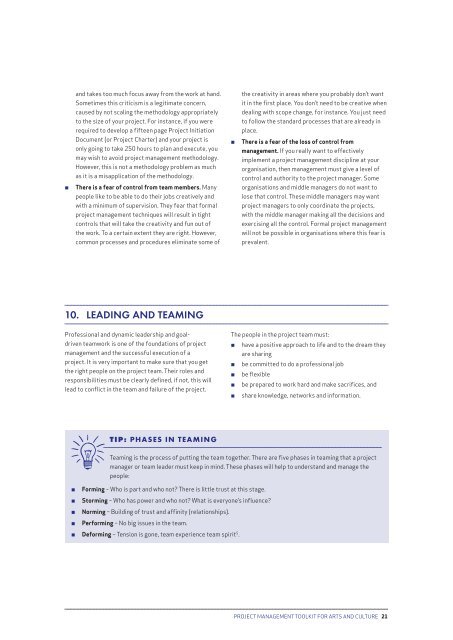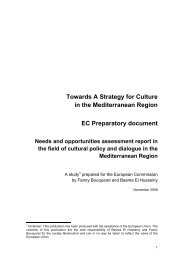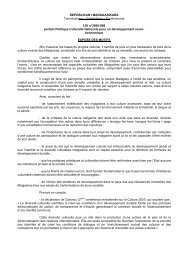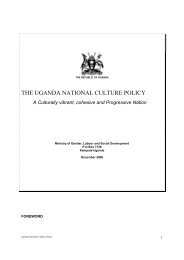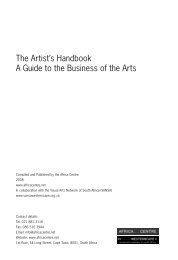Project Management Toolkit - Arts In Africa
Project Management Toolkit - Arts In Africa
Project Management Toolkit - Arts In Africa
Create successful ePaper yourself
Turn your PDF publications into a flip-book with our unique Google optimized e-Paper software.
and takes too much focus away from the work at hand.<br />
Sometimes this criticism is a legitimate concern,<br />
caused by not scaling the methodology appropriately<br />
to the size of your project. For instance, if you were<br />
required to develop a fifteen page <strong>Project</strong> <strong>In</strong>itiation<br />
Document (or <strong>Project</strong> Charter) and your project is<br />
only going to take 250 hours to plan and execute, you<br />
may wish to avoid project management methodology.<br />
However, this is not a methodology problem as much<br />
as it is a misapplication of the methodology.<br />
¬ There is a fear of control from team members. Many<br />
people like to be able to do their jobs creatively and<br />
with a minimum of supervision. They fear that formal<br />
project management techniques will result in tight<br />
controls that will take the creativity and fun out of<br />
the work. To a certain extent they are right. However,<br />
common processes and procedures eliminate some of<br />
10. LEADING AND TEAMING<br />
Professional and dynamic leadership and goaldriven<br />
teamwork is one of the foundations of project<br />
management and the successful execution of a<br />
project. It is very important to make sure that you get<br />
the right people on the project team. Their roles and<br />
responsibilities must be clearly defined, if not, this will<br />
lead to conflict in the team and failure of the project.<br />
Tip: phases in teaming<br />
¬<br />
the creativity in areas where you probably don’t want<br />
it in the first place. You don’t need to be creative when<br />
dealing with scope change, for instance. You just need<br />
to follow the standard processes that are already in<br />
place.<br />
There is a fear of the loss of control from<br />
management. If you really want to effectively<br />
implement a project management discipline at your<br />
organisation, then management must give a level of<br />
control and authority to the project manager. Some<br />
organisations and middle managers do not want to<br />
lose that control. These middle managers may want<br />
project managers to only coordinate the projects,<br />
with the middle manager making all the decisions and<br />
exercising all the control. Formal project management<br />
will not be possible in organisations where this fear is<br />
prevalent.<br />
The people in the project team must:<br />
¬ have a positive approach to life and to the dream they<br />
are sharing<br />
¬ be committed to do a professional job<br />
¬ be flexible<br />
¬ be prepared to work hard and make sacrifices, and<br />
¬ share knowledge, networks and information.<br />
Teaming is the process of putting the team together. There are five phases in teaming that a project<br />
manager or team leader must keep in mind. These phases will help to understand and manage the<br />
people:<br />
¬ Forming – Who is part and who not? There is little trust at this stage.<br />
¬ Storming – Who has power and who not? What is everyone’s influence?<br />
¬ Norming – Building of trust and affinity (relationships).<br />
¬ Performing – No big issues in the team.<br />
¬ Deforming – Tension is gone, team experience team spirit5 .<br />
PROJECT MANAGEMENT TOOLKIT FOR ARTS AND CULTURE 21


